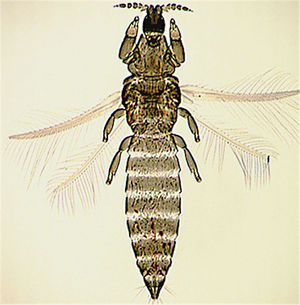Difference between revisions of "Arorathrips mexicanus"
| Line 9: | Line 9: | ||
''Chirothrips saltensis'' Tapia, 1952: 109. | ''Chirothrips saltensis'' Tapia, 1952: 109. | ||
== Biology and Distribution == | == Biology and Distribution == | ||
| − | Described from | + | Described from Guadalajara, Mexico (''C. mexicanus''), New Orleans, Louisiana USA (''C. catchingsi''), Florida USA (''C. floridensis''), and Argentina (''C. saltensis''). |
== References == | == References == | ||
Crawford DL (1909) On some Thysanoptera from Mexico and the south. ''Pomona College Journal of Entomology'' 1: 109–119. | Crawford DL (1909) On some Thysanoptera from Mexico and the south. ''Pomona College Journal of Entomology'' 1: 109–119. | ||
Revision as of 02:58, 4 August 2015
Nomenclatural details
Chirothrips mexicana Crawford DL, 1909: 114.
Chirothrips floridensis Watson, 1920: 22.
Chirothrips catchingsi Watson, 1924: 76.
Chirothrips saltensis Tapia, 1952: 109.
Biology and Distribution
Described from Guadalajara, Mexico (C. mexicanus), New Orleans, Louisiana USA (C. catchingsi), Florida USA (C. floridensis), and Argentina (C. saltensis).
References
Crawford DL (1909) On some Thysanoptera from Mexico and the south. Pomona College Journal of Entomology 1: 109–119.
Watson JR (1920) New Thysanoptera from Florida VII. Florida Entomologist 4: 18–23.
Watson JR (1924) Synopsis and catalog of the Thysanoptera of North America. Bulletin of the Agricultural Experiment Station, University of Florida 168: 1–100.
Tapia, E.A. (1952) Dos especies de Tisanopteros Argentinos nuevos para la Ciencia. Anales de la Sociedad Cientifica Argentina 54, 107–110.
Hoddle HS, Mound LA & Paris D (2012) Thrips of California 2012. [1]
Type information
Holotype female (C. catchingsi), Florida State Collection of Arthropods, Gainesville.
Syntype (C. mexicanus), National Museum of Natural History, Smithsonian Institution, Washington DC.
